-
01-01-2015
Critical incidents in nursing academics: discovering a new identity
Revista Brasileira de Enfermagem. 2015;68(2):219-227
Abstract
Critical incidents in nursing academics: discovering a new identity
Revista Brasileira de Enfermagem. 2015;68(2):219-227
DOI 10.1590/0034-7167.2015680206i
Views0See moreABSTRACT
Objective:
a qualitative study that followed the principles of the grounded theory in order to analyze the professional identity of nursing academics through the analysis of the most disturbing critical incidents.
Method:
semi-structured interviews were conducted with seven nurses who worked as professors and researchers in a private university in Barcelona.
Results:
the resulting empirical material was organized into two categories: characterization of critical incidents and responsiveness to the incident.
Conclusion:
the professional identity of nurses regarding the academic area is still under construction and inexperience is the major obstacle in the management of critical incidents in the teaching career.
-
01-01-2015
Body mass index, waist circumference, and arterial hypertension in students
Revista Brasileira de Enfermagem. 2015;68(2):214-218
Abstract
Body mass index, waist circumference, and arterial hypertension in students
Revista Brasileira de Enfermagem. 2015;68(2):214-218
DOI 10.1590/0034-7167.2015680205i
Views0See moreABSTRACT
Objective:
to investigate what is the best anthropometric predictor of arterial hypertension among private school students.
Method:
this was a cross-sectional study with 286 students between the ages of 10 and 14 from two private schools in the city of Paranavaí, Paraná, Brazil. The following variables were analyzed: body mass index, waist circumference and blood pressure. Statistical analysis was conducted with Pearson’s partial correlation test and multivariate logistic regression, with p<0.05.
Results:
both anthropometric indicators displayed weak correlation with systolic and diastolic levels, with coeffi cients (r) ranging from 0.27 to 0.36 (p < 0.001). Multivariate analysis showed that the only anthropometric indicator associated with arterial hypertension was waist circumference (OR= 2.3; 95% CI: 1.1-4.5), regardless of age or gender.
Conclusion:
this age group, waist circumference appeared to be a better predictor for arterial hypertension than body mass index.
-
01-01-2015
Perception of primary healthcare management nurses on the nursing process
Revista Brasileira de Enfermagem. 2015;68(2):206-213
Abstract
Perception of primary healthcare management nurses on the nursing process
Revista Brasileira de Enfermagem. 2015;68(2):206-213
DOI 10.1590/0034-7167.2015680204i
Views0See moreABSTRACT
Objective:
this qualitative study aimed to analyze the perceptions of primary health care management nurses on the nursing process.
Method:
data were collected through interviews and analyzed by the Content Analysis proposed by Bardin’s theoretical framework.
Results:
managers recognize the importance of the nursing process, although its implementation was not a priority at the time of the interviews. A conceptual diffi culty and a lack of understanding that the implementation of the care methodology should be a cross-departmental action in the local healthcare management were clearly observed.
Conclusion:
managers should have their perspectives broadened concerning the relevance of the nursing process and the professional training. The active participation of legislative nursing bodies, local healthcare management and the federal government may open the way for the effective implementation of the nursing process.
-
01-01-2015
Cross-cultural cultural adaptation of the “Nursing Students’ Attitudes Toward Mental Health Nursing and Consumers” in Brazil
Revista Brasileira de Enfermagem. 2015;68(2):198-205
Abstract
Cross-cultural cultural adaptation of the “Nursing Students’ Attitudes Toward Mental Health Nursing and Consumers” in Brazil
Revista Brasileira de Enfermagem. 2015;68(2):198-205
DOI 10.1590/0034-7167.2015680203i
Views0See moreABSTRACT
Objective:
to make across-cultural adaptation of the “Nursing Students’ Attitudes Toward Mental Health Nursing and Consumers” scale in Brazil.
Method:
the scale was tested regarding conceptual, item, semantic, and operational equivalence.
Results:
content validation was conducted by an expert committee with a minimum consensus level of 80%. This process resulted in a 35-item scale divided into 6 factors. The experts reached 100% consensus on the scale’s clarity of language, practical pertinence and theoretical relevance, as well as on the need for excluding one factor. Data were collected in 2013 in the city of Londrina, Paraná, Brazil.
Conclusion:
the instrument was cross-culturally adapted to Brazilian Portuguese and presented satisfactory content validity. We propose further studies on the scale’s psychometric properties, such as construct validity, internal consistency and reliability.
-
01-01-2015
Relational skills and preserving patient privacy in the caring process
Revista Brasileira de Enfermagem. 2015;68(2):191-197
Abstract
Relational skills and preserving patient privacy in the caring process
Revista Brasileira de Enfermagem. 2015;68(2):191-197
DOI 10.1590/0034-7167.2015680202i
Views0See moreABSTRACT
Objective:
to analyze the development and mobilization of relational skills central to the caring process among nursing students throughout their professional training.
Method:
this was a quantitative study, descriptive and cross-sectional in design. The sample consisted of nursing undergraduate students from the Higher School of Health Sciences, in the city of Évora, Portugal. Data were collected using the previously validated Helping Relational Skills Inventory.
Results:
the students gradually acquired “generic skills”, “communication skills” and “contact skills”, presenting the highest mean score in the last year of the program. However, the highest mean score for the “empathetic skills” subscale was presented by second-year students.
Conclusion:
age and year in program were found to be decisive variables regarding the acquisition of specifi c skills (empathetic and communication) by nursing students.
-
01-01-2015
The Brazilian Association of Nursing in the uncompromising defense of the Brazilian Unified Health System
Revista Brasileira de Enfermagem. 2015;68(2):185-186
Abstract
The Brazilian Association of Nursing in the uncompromising defense of the Brazilian Unified Health System
Revista Brasileira de Enfermagem. 2015;68(2):185-186
DOI 10.1590/0034-7167.2015680201i
Views0The title of the 2015 Editor’s Comments could very well be from a journal published in decades past, a time when, in Brazil, all professional entities and civil society fought for the right to health, as was later established in the Brazilian Constitution of 1988. Twenty-five years later, despite its financial limitations and restricted operational […]See more -
01-01-2015
A ABEn na defesa intransigente do SUS
Revista Brasileira de Enfermagem. 2015;68(2):185-186
Abstract
A ABEn na defesa intransigente do SUS
Revista Brasileira de Enfermagem. 2015;68(2):185-186
DOI 10.1590/0034-7167.2015680201i
Views0Este título do Editorial de 2015 bem poderia ser de uma revista publicada em décadas passadas, período em que todas as entidades profissionais e a sociedade civil lutaram pela saúde como direito, como conquistado na Constituição de 1988. Vinte e cinco anos depois, com o Sistema Único de Saúde capilarizado por todo o país, mesmo […]See more -
EXPERIENCE REPORT01-01-2015
Nursing diagnoses and interventions for a child after cardiac surgery in an intensive care unit
Revista Brasileira de Enfermagem. 2015;68(1):155-160
Abstract
EXPERIENCE REPORTNursing diagnoses and interventions for a child after cardiac surgery in an intensive care unit
Revista Brasileira de Enfermagem. 2015;68(1):155-160
DOI 10.1590/0034-7167.2015680121i
Views0See moreObjetivo:
descrever o julgamento clínico de enfermagem para identificar diagnósticos NANDA e desenvolver um plano de tratamento NIC para uma criança em pós-operatório de cirurgia cardíaca em terapia intensiva.
Método:
estudo de caso com coleta de dados retrospectiva no prontuário.
Resultados:
três enfermeiras identificaram diagnósticos NANDA e intervenções NIC. Criança de 6 meses, submetida a cirurgia cardíaca, necessitou oxigenação extracorpórea por membrana no pós-operatório. Foram identificados quatro principais diagnósticos, aos quais foram direcionadas dez intervenções. A proposta de intervenções para responder às necessidades humanas prioritárias da criança foi otimizada pelo uso das terminologias padronizadas. Todos os diagnósticos foram sustentados por indicadores diagnósticos; todas as intervenções foram cientificamente sustentadas.
Conclusão:
espera-se que os enfermeiros abordem não somente as respostas fisiológicas, mas também aquelas dos domínios psicossociais.
-
REVIEW05-13-2024
Technologies used in the treatment of burn victims in intensive care: a scope review
Revista Brasileira de Enfermagem. 2024;77(1):e20220738
Abstract
REVIEWTechnologies used in the treatment of burn victims in intensive care: a scope review
Revista Brasileira de Enfermagem. 2024;77(1):e20220738
DOI 10.1590/0034-7167-2022-0738
Views0See moreABSTRACT
Objectives:
to analyze the technologies used by the nursing team in the treatment of skin lesions caused by burns in patients under intensive care.
Methods:
this is a scope review conducted on the LILACS, Medline, PubMed, and CINAHL databases without temporal or language restrictions.
Results:
the highlighted technologies included the use of specialized dressings, biological agents such as probiotics and cyanobacteria, as well as negative pressure therapies and enzymes such as papain and collagenase. Some technologies, such as nanocrystalline silver, demonstrated efficacy in infection control.
Final Considerations:
the study identified essential technologies in burn care, emphasizing the need for further research on “soft” technologies. The findings support the promotion of evidence-based nursing care for burn patients in intensive care and enhance knowledge about effective treatments.
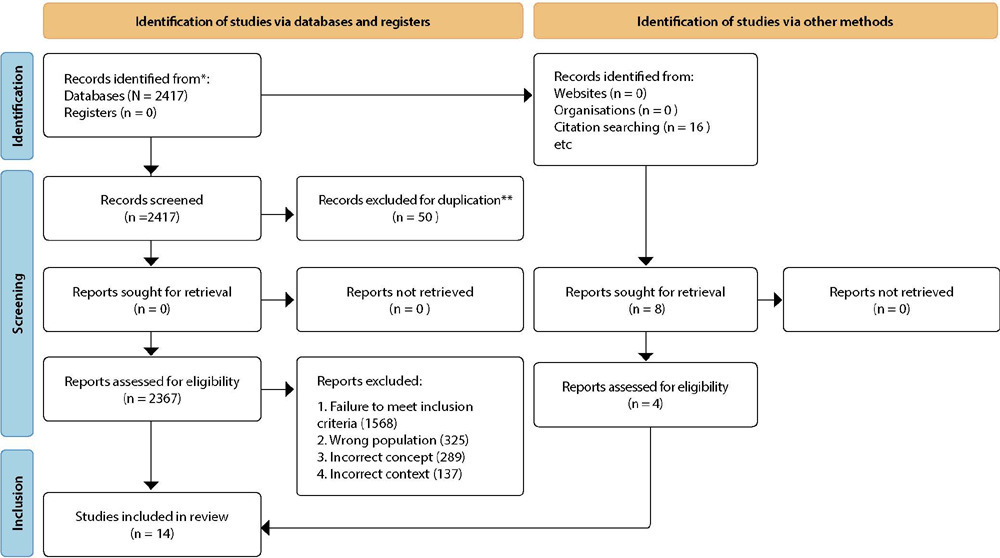
-
ORIGINAL ARTICLE05-03-2024
Cancer patient satisfaction regarding the quality of information received: psychometric validity of EORTC QLQ-INFO25
Revista Brasileira de Enfermagem. 2024;77(1):e20230358
Abstract
ORIGINAL ARTICLECancer patient satisfaction regarding the quality of information received: psychometric validity of EORTC QLQ-INFO25
Revista Brasileira de Enfermagem. 2024;77(1):e20230358
DOI 10.1590/0034-7167-2023-0358
Views0See moreABSTRACT
Objectives:
to psychometrically validate the European Organization for Research and Treatment of Cancer Core Quality of Life Questionnaire EORTC QLQ-INFO25 instrument and identify the domains that influence patients’ perception of the information received.
Methods:
a cross-sectional methodology with cancer patients in a Brazilian philanthropic hospital institution. Sociodemographic and clinical instruments, EORTC QLQ-C30, EORTC QLQ-INFO25 and Supportive Care Needs Survey – Short Form 34 were used. Analysis occurred using Cronbach’s alpha coefficients, intraclass correlation, test-retest and exploratory factor analysis.
Results:
128 respondents participated. Cronbach’s alpha coefficient was 0.85. The test-retest obtained p-value=0.21. In the factor analysis, one item was excluded. Satisfaction with the information received was 74%, with three areas with averages below 70%. In open-ended questions, there was a greater desire for information.
Conclusions:
validity evidence was obtained with instrument reliability, consistency and stability. Respondents expressed satisfaction with the information received.
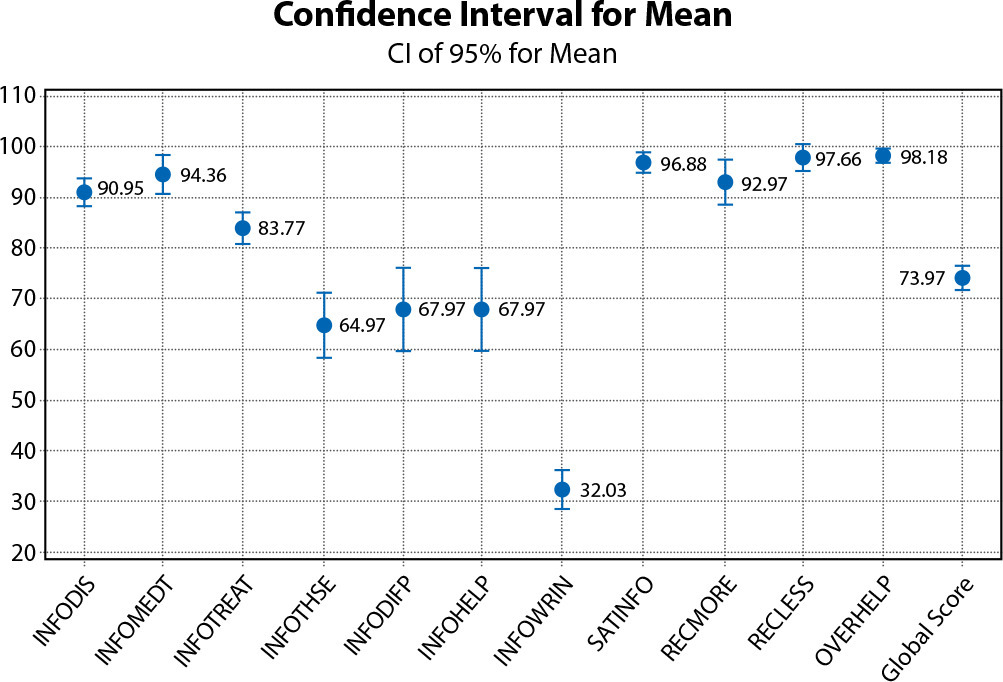
-
05-03-2024
Intervenções de Enfermagem para capacitar o cuidador familiar de uma pessoa com amputação de membro inferior: revisão de escopo
Revista Brasileira de Enfermagem. 2024;77(1):e20230264
Abstract
Intervenções de Enfermagem para capacitar o cuidador familiar de uma pessoa com amputação de membro inferior: revisão de escopo
Revista Brasileira de Enfermagem. 2024;77(1):e20230264
DOI 10.1590/0034-7167-2023-0264
Views0See moreRESUMEN
Objetivos:
mapear intervenciones de enfermería que capaciten al cuidador familiar de la persona con amputación de miembro inferior para su rol.
Métodos:
es una revisión de alcance guiada por la metodología del Instituto Joanna Briggs, llevada a cabo en diferentes bases de datos (incluyendo literatura gris).
Resultados:
se tuvieron en cuenta seis estudios publicados entre 2009 y 2021, a saber: intervenciones de asesoramiento y apoyo para pacientes y familiares; intervenciones de apoyo entre iguales realizadas por un par de profesionales certificados; participación de cuidadores o familiares en grupos de apoyo e intervenciones clave para el equilibrio psicológico del paciente y del cuidador familiar. Dos estudios analizaron la importancia de la formación del cuidador y del amputado y del desarrollo de habilidades de afrontamiento. Otro estudio recomendó intervenciones de apoyo informativo para los cuidadores en relación con el cuidado del amputado y su adaptación a la vida hogareña.
Conclusiones:
los resultados de esta revisión permiten identificar recomendaciones/directrices para la práctica y recomendaciones/sugerencias de intervenciones según las necesidades identificadas de los cuidadores familiares de pacientes con amputación de miembros inferiores.
-
REVIEW05-03-2024
Nursing interventions to empower the family caregiver of person with lower limb amputation: scoping review
Revista Brasileira de Enfermagem. 2024;77(1):e20230264
Abstract
REVIEWNursing interventions to empower the family caregiver of person with lower limb amputation: scoping review
Revista Brasileira de Enfermagem. 2024;77(1):e20230264
DOI 10.1590/0034-7167-2023-0264
Views0See moreABSTRACT
Objectives:
to map nursing interventions that empower the Family caregiver of the person with lower limb amputation for is role.
Methods:
scoping review guided by Joanna Briggs Institute methodology conducted in different databases (including gray literature).
Results:
six studies published between 2009 and 2021 were included. Interventions of counselling and support for patients and family; peer support interventions performed by a certified pair; involvement of caregivers or family members in support groups; and key interventions for patient and family caregiver psychological balance. Two studies discussed the importance of caregiver and amputee training and development of coping skills. Another study recommended Interventions of informative support for caregivers regarding care for the amputee and adaptation to home.
Conclusions:
results of this review allow the identification of recommendations (guidelines) for practice and recommendations/suggestions for interventions according with identified needs of family caregivers of patients with lower limb amputation.
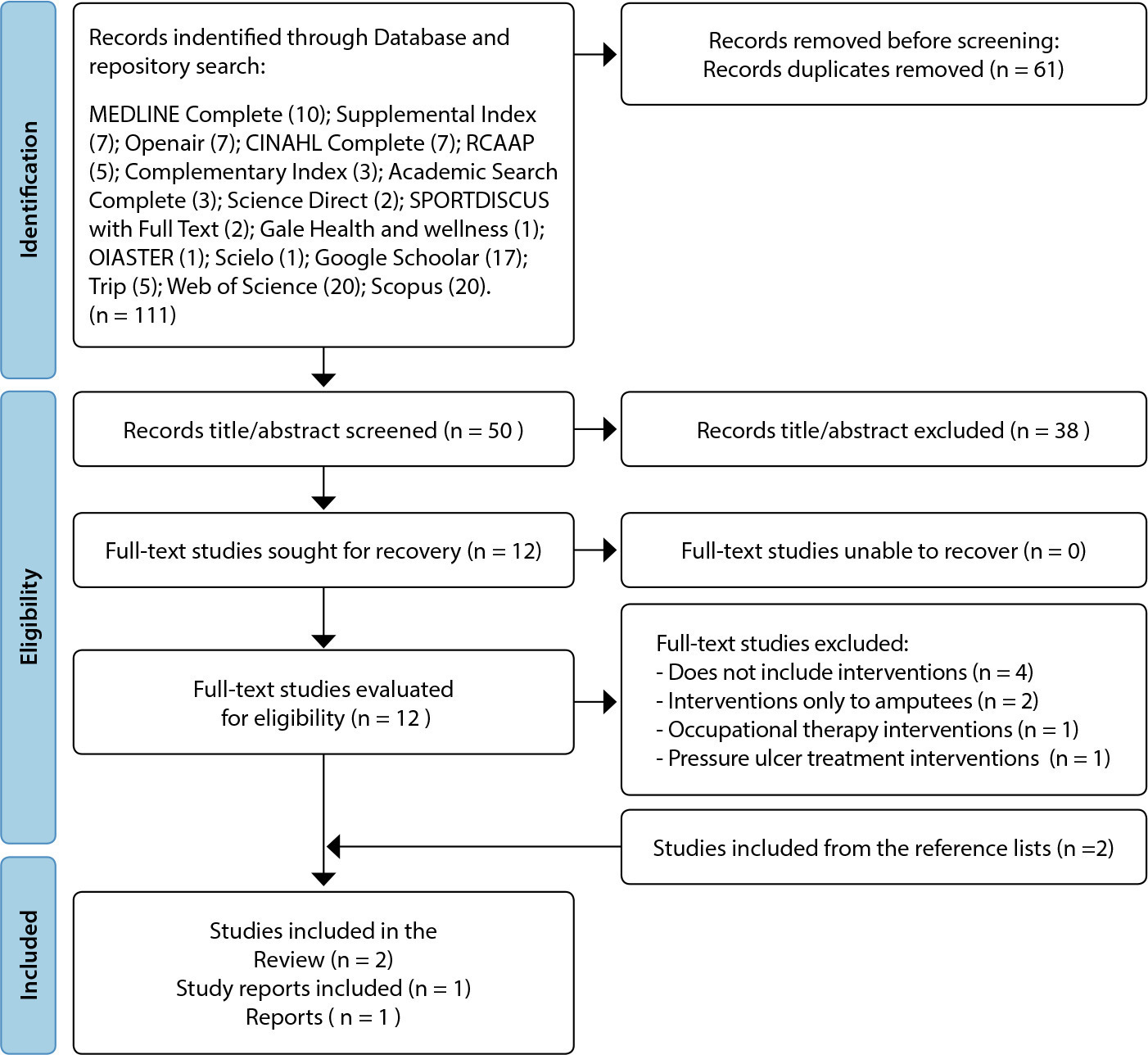
-
ORIGINAL ARTICLE05-03-2024
Pregnancy loss in women with systemic lupus erythematosus: Grounded Theory
Revista Brasileira de Enfermagem. 2024;77(1):e20230225
Abstract
ORIGINAL ARTICLEPregnancy loss in women with systemic lupus erythematosus: Grounded Theory
Revista Brasileira de Enfermagem. 2024;77(1):e20230225
DOI 10.1590/0034-7167-2023-0225
Views0See moreABSTRACT
Objective:
to learn the meanings attributed to pregnancy loss by women with Lupus.
Method:
qualitative research, based on Symbolic Interactionism and Grounded Theory. Data collection took place between January and August 2022 through in-depth interviews. Data analysis went through the stages of initial and focused coding.
Results:
seventeen women participated. The central phenomenon “The climb to motherhood: falls and overcoming” was constructed, consisting of three categories: “Falling to the ground during the climb: the experience of pregnancy loss”; “Getting up and following the path: new attempts to conceive”; and “Remembering the journey: meanings attributed to pregnancy losses”.
Final considerations:
experiencing pregnancy is, analogously, like climbing a mountain, where obstacles need to be overcome to reach the summit. The experience of pregnancy loss is seen as complex, especially when there is fragility in healthcare and a lack of awareness regarding feelings of loss and grief.
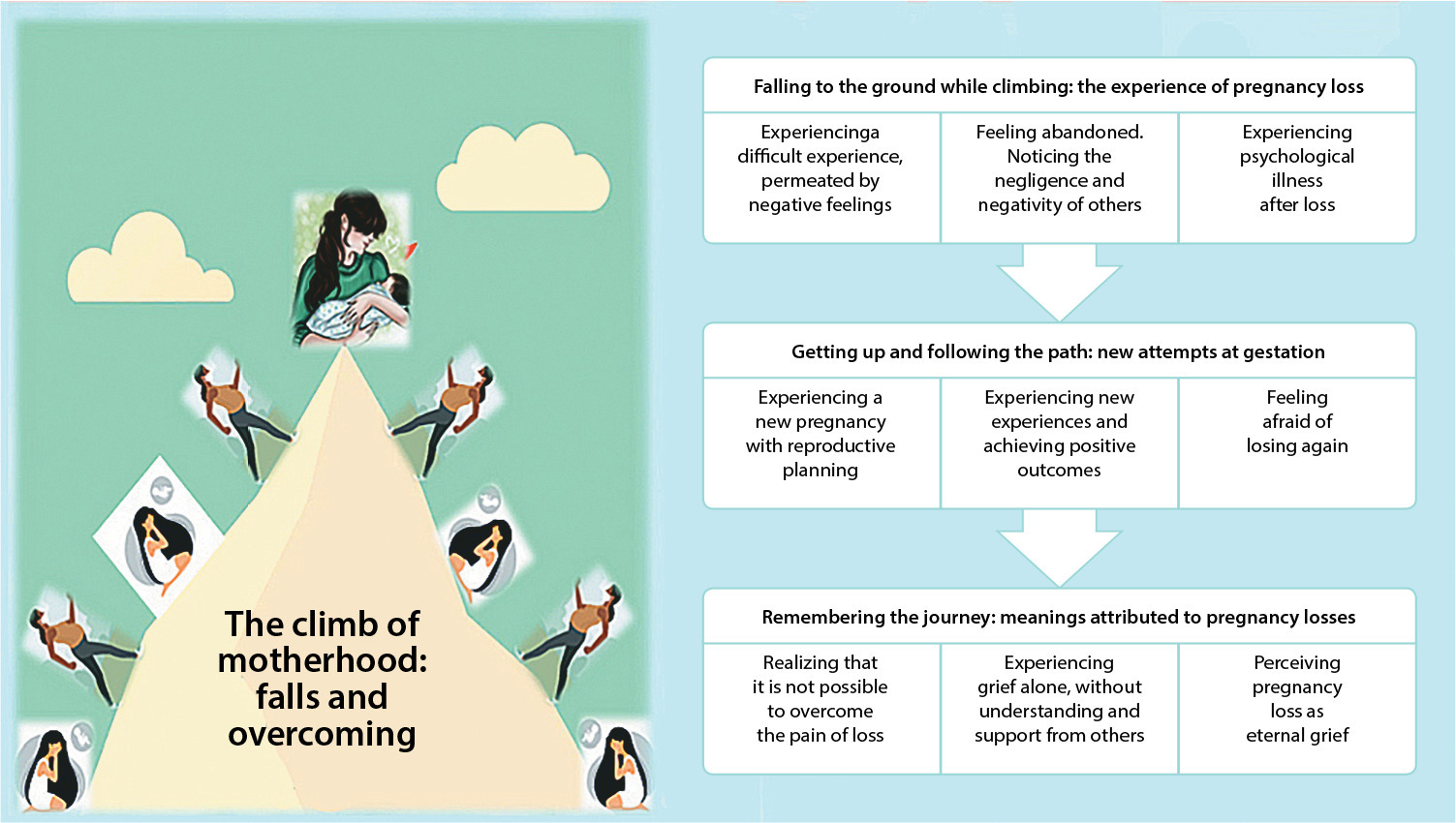
-
ORIGINAL ARTICLE05-03-2024
Josicélia Dumêt Fernandes’ professional trajectory: contributions to psychiatric and mental health nursing
Revista Brasileira de Enfermagem. 2024;77(1):e20230174
Abstract
ORIGINAL ARTICLEJosicélia Dumêt Fernandes’ professional trajectory: contributions to psychiatric and mental health nursing
Revista Brasileira de Enfermagem. 2024;77(1):e20230174
DOI 10.1590/0034-7167-2023-0174
Views0See moreABSTRACT
Objectives:
to analyze nurse Josicélia Dumêt Fernandes’ life story, with emphasis on her work in the psychiatry and mental health fields.
Methods:
historical, qualitative research. Semi-structured interviews and documentary research were used as data collection techniques, collected from September to October 2021. For data analysis, we opted for the content analysis method and comparison with the Foucauldian philosophical framework.
Results:
four categories emerged: Transforming herself and mental health practices; (Re)framing professional practice; Nursing practice and power relations; and The paths and implications in the psychiatry and mental health fields.
Final Considerations:
the study of the biographer demonstrates a search for transformation of herself and mental health practices, with a rupture in paradigms and reframing of her practice in psychiatry and mental health.
-
05-03-2024
Propiedades psicométricas de la versión chilena del cuestionario de calidad de vida para mieloma múltiple
Revista Brasileira de Enfermagem. 2024;77(1):e20230100
Abstract
Propiedades psicométricas de la versión chilena del cuestionario de calidad de vida para mieloma múltiple
Revista Brasileira de Enfermagem. 2024;77(1):e20230100
DOI 10.1590/0034-7167-2023-0100es
Views0See moreRESUMEN
Objetivos:
Evaluar consistencia interna y validez de constructo del QLQ-MY20 para valoración de calidad de vida en sobrevivientes de mieloma múltiple en Chile.
Métodos:
Estudio transversal, realizado entre marzo 2020 y diciembre 2022. Participaron 118 personas de dos hospitales públicos. Se utilizaron los cuestionarios QLQ-C30 y QLQ-MY20. Fueron evaluadas la consistencia interna con alfa de Cronbach (α) y validez de constructo mediante pruebas de hipótesis (Mann Whitney y correlación de Spearman).
Resultados:
El promedio de edad de los participantes era 67,2 (DE=9,2) años. Consistencia interna para escala completa (α=0,779), dimensión “síntomas de la enfermedad” (α=0,671), dimensión “efectos secundarios de los tratamientos” (α=0,538) y dimensión “perspectiva de futuro” (α=0,670). Se comprobaron cuatro de las cinco hipótesis de la validez de constructo: presentaron más síntomas las mujeres, personas con peor performance estatus, con dolor y con peor fatiga.
Conclusiones:
La versión chilena del QLQ-MY20 presenta adecuada consistencia interna y validez de constructo.
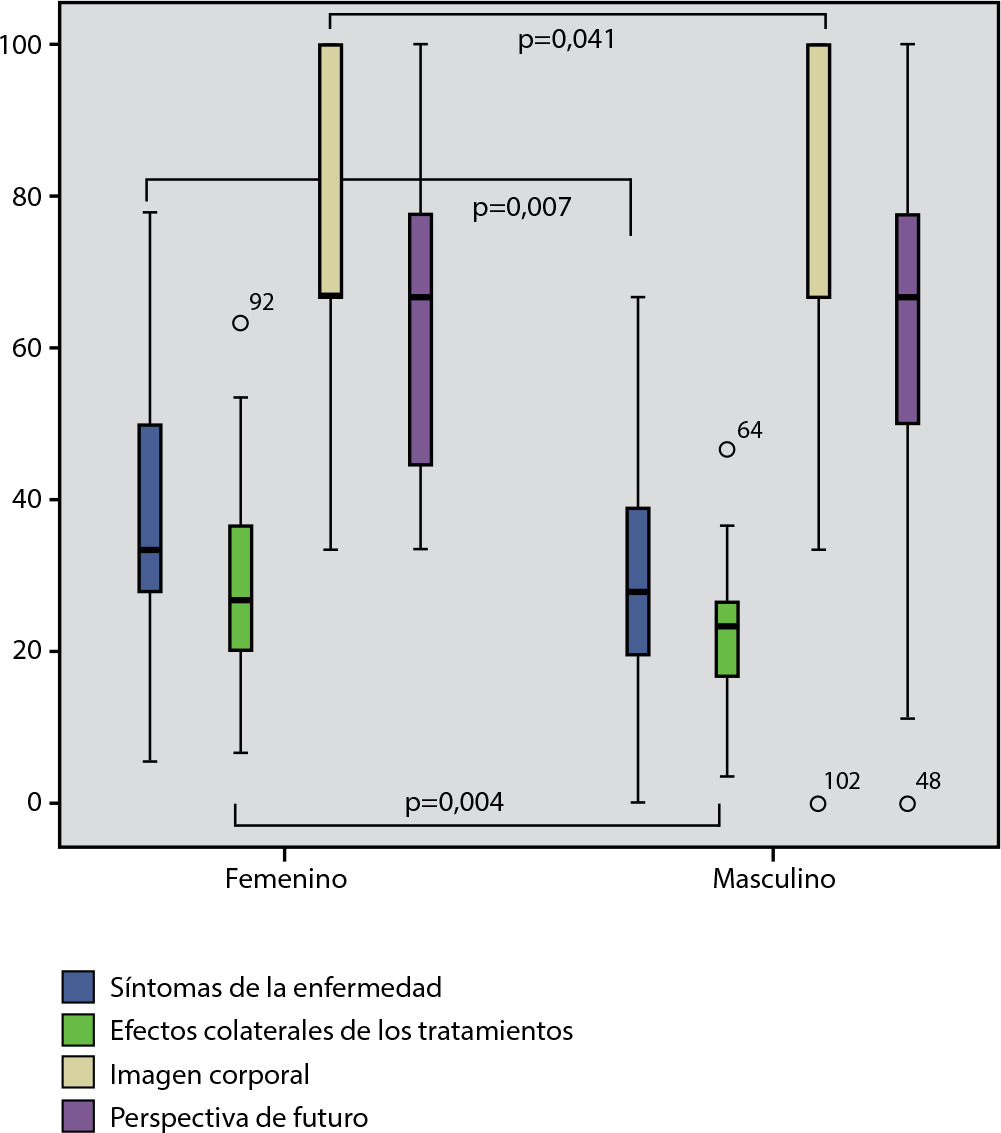
-
ORIGINAL ARTICLE05-03-2024
Psychometric properties of the Chilean version of the quality of life questionnaire for multiple myeloma
Revista Brasileira de Enfermagem. 2024;77(1):e20230100
Abstract
ORIGINAL ARTICLEPsychometric properties of the Chilean version of the quality of life questionnaire for multiple myeloma
Revista Brasileira de Enfermagem. 2024;77(1):e20230100
DOI 10.1590/0034-7167-2023-0100
Views0See moreABSTRACT
Objectives:
To evaluate the internal consistency and construct validity of the QLQ-MY20 for assessing the quality of life in multiple myeloma survivors in Chile.
Methods:
This was a cross-sectional study conducted between March 2020 and December 2022. It involved 118 individuals from two public hospitals. The QLQ-C30 and QLQ-MY20 questionnaires were used. Internal consistency was assessed using Cronbach’s alpha(α), and construct validity was evaluated through hypothesis testing (Mann-Whitney and Spearman correlation).
Results:
The average age of participants was 67.2 years (SD=9.2). Internal consistency for the complete scale was α=0.779, for the “disease symptoms” dimension α=0.671, for the “side effects of treatments” dimension α=0.538, and for the “future perspective” dimension α=0.670. Four of the five construct validity hypotheses were confirmed: women, individuals with worse performance status, those with pain, and those with worse fatigue showed more symptoms.
Conclusions:
The Chilean version of the QLQ-MY20 demonstrates adequate internal consistency and construct validity.
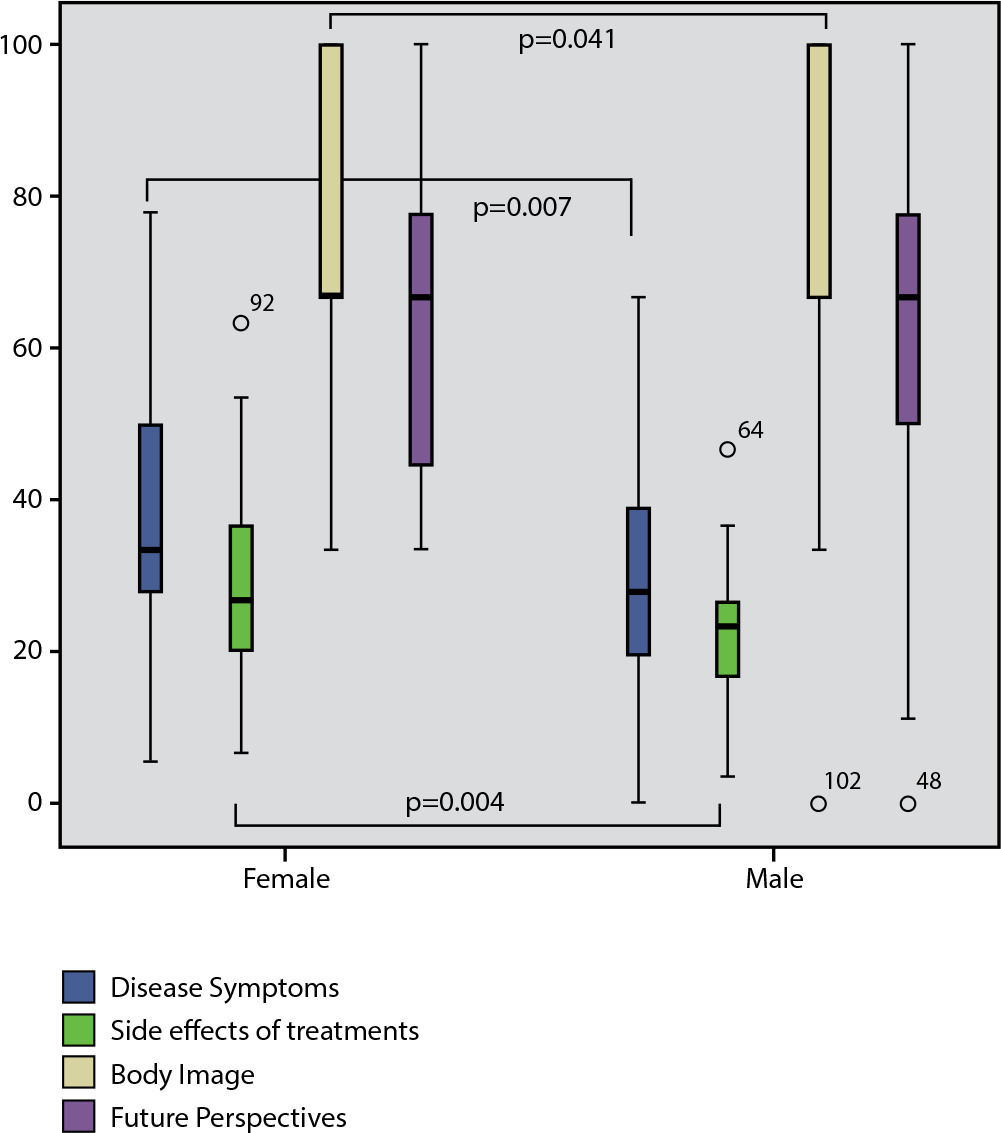
-
12-04-2023
A cronicidade e o seu impacto na saúde do trabalhador: uma chamada para ações concretas
Revista Brasileira de Enfermagem. 2023;76:e76suppl301
Abstract
A cronicidade e o seu impacto na saúde do trabalhador: uma chamada para ações concretas
Revista Brasileira de Enfermagem. 2023;76:e76suppl301
DOI 10.1590/0034-7167.202376suppl301pt
Views0A relação entre cronicidade e trabalho tem sido uma preocupação crescente na sociedade contemporânea. À medida que o número de doenças crônicas aumenta em todo o mundo, é fundamental compreender como essas condições impactam a saúde dos trabalhadores(). Neste editorial, exploraremos os impactos da cronicidade na saúde do trabalhador, destacando dados da Carga Global de […]See more -
12-04-2023
Chronicity and its impact on workers’ health: a call for concrete actions
Revista Brasileira de Enfermagem. 2023;76:e76suppl301
Abstract
Chronicity and its impact on workers’ health: a call for concrete actions
Revista Brasileira de Enfermagem. 2023;76:e76suppl301
DOI 10.1590/0034-7167.202376suppl301
Views0The relationship between chronicity and work has been a growing concern in contemporary society. As the number of chronic illnesses increases around the world, it is critical to understand how these conditions impact workers’ health(). In this editorial, we will explore the impacts of chronicity on workers’ health, highlighting data from the Global Burden of […]See more -
12-04-2023
General Law on Personal Data Protection and applicability to Nursing
Revista Brasileira de Enfermagem. 2023;76:e20230126
Abstract
General Law on Personal Data Protection and applicability to Nursing
Revista Brasileira de Enfermagem. 2023;76:e20230126
DOI 10.1590/0034-7167-2023-0126
Views0See moreABSTRACT
Objectives:
to reflect on the impacts of the General Personal Data Protection Law on Nursing practice.
Methods:
reflection article, through the intentional collection of materials relating to the topic.
Results:
legislation regulates confidentiality, processing and data sharing, requiring institutional protection measures. The nursing team is responsible for acting preventively, both in care and in the management role, in order to avoid the misuse of the patient’s personal data. The law allows academic research to be carried out as long as the purpose is clear, data collection occurs with an explicit purpose and data is anonymized.
Final Considerations:
although the General Personal Data Protection Law requires greater care in relation to data processing, it is established on precepts of good faith and respect for the rights of the individual, concepts aligned with the nursing code of ethics.

-
REVIEW12-04-2023
Supervision of professional nursing practice in Brazil: a scoping review
Revista Brasileira de Enfermagem. 2023;76:e20230077
Abstract
REVIEWSupervision of professional nursing practice in Brazil: a scoping review
Revista Brasileira de Enfermagem. 2023;76:e20230077
DOI 10.1590/0034-7167-2023-0077
Views0See moreABSTRACT
Objectives:
to map studies that analyze the audit process of nursing councils.
Methods:
this is a scoping review, anchored in the JBI framework, with the guiding question: what is the evidence of the audit process of legal practice of nursing by class councils (COFEN/COREN system)? The searches were carried out in October and November 2022 without limitation of language and year.
Results:
of the 9 selected studies, all are Brazilian and published from 2014 onwards. Among the topics addressed are the role, challenges, costs and difficulties in nurse auditors’ daily work process, in addition to the contribution of the audit sector in Brazil.
Conclusions:
the studies gathered discuss aspects related to costs, challenges and difficulties, but there is no focus on corrective, disciplinary and educational activities as well as little is said about the audit process, its reporting, referral and outcomes.

-
ORIGINAL ARTICLE12-04-2023
Overview of nursing ethics teaching in Brazilian public higher education institutions
Revista Brasileira de Enfermagem. 2023;76:e20220808
Abstract
ORIGINAL ARTICLEOverview of nursing ethics teaching in Brazilian public higher education institutions
Revista Brasileira de Enfermagem. 2023;76:e20220808
DOI 10.1590/0034-7167-2022-0808
Views0See moreABSTRACT
Objectives:
to outline the teaching of ethics in undergraduate Nursing programs in Brazilian public higher education institutions.
Methods:
descriptive and exploratory study, carried out through the documentary analysis of pedagogical projects of undergraduate Nursing programs in Brazil.
Results:
153 active undergraduate Nursing programs were found, of which 106 provide the pedagogical project. In addition to deontological teaching, the teaching of ethics was identified in a transversal way associated with themes such as Social Context, Hospital and Community Care, Pharmacology, Systematization of Nursing Care, Surgical Nursing, Epidemiology, Palliative Care, Management in Nursing, Diversity, Women’s, Children’s, Adolescent’s, Adult’s and Older People’s Health, and Mental Health.
Final Considerations:
the challenge in teaching nursing ethics is its integration with each action of caring, teaching and managing.

-
12-04-2023
La ética de la atención de enfermería a las personas transgénero
Revista Brasileira de Enfermagem. 2023;76:e20220797
Abstract
La ética de la atención de enfermería a las personas transgénero
Revista Brasileira de Enfermagem. 2023;76:e20220797
DOI 10.1590/0034-7167-2022-0797es
Views0See moreRESUMEN
Objetivos:
debatir sobre aspectos éticos en la atención de enfermería a personas transgénero.
Métodos:
estudio reflexivo fundamentado sobre los dilemas que se plantean en los cuidados de enfermería a personas transgénero. El relato se ha estructurado en torno a los cuatro principios bioéticos.
Resultados:
la atención sanitaria a las personas trans es compleja, transversal a muchos dispositivos y especialidades y longitudinal en el tiempo por lo que precisa de la actuación coordinada. Existe un marco ético en el que se encuadran los cuidados de enfermería que se precisan en la atención a este colectivo.
Consideraciones Finales:
la enfermera como agente de salud puede asumir diversas líneas generales en la atención a pacientes transgénero. Para ello, se debe brindar formación adicional no solo a los profesionales, también a los estudiantes de enfermería y de las demás ciencias de la salud.
-
12-04-2023
Ethical dilemmas at the end of life: a reflection from the Philosophical Perspective of Luigina Mortari
Revista Brasileira de Enfermagem. 2023;76:e20220759
Abstract
Ethical dilemmas at the end of life: a reflection from the Philosophical Perspective of Luigina Mortari
Revista Brasileira de Enfermagem. 2023;76:e20220759
DOI 10.1590/0034-7167-2022-0759
Views0See moreABSTRACT
Objectives:
to reflect on the ethical dilemmas involved in the care of patients at the end of their lives.
Methods:
this is a theoretical-reflective study based on the ethics of care proposed by Luigina Mortari.
Results:
discussing care involves addressing the ways of being inherent to human existence and understanding the unique characteristics of this condition. Ethical care constitutes an action driven by interest in the other and by the perception of their need. Ethical dilemmas are a part of end-of-life care, making it essential to maintain respectful assistance that considers the patient’s autonomy, using strategies for expressing their wishes, and ensuring continuous clear and empathetic communication among all those involved in providing care.
Final Considerations:
issues related to being, stemming from one’s reality of dependency and vulnerability, contribute to the emergence of ethical dilemmas present in care actions.
Search
Search in:
Nuvem de Tags
Adolescente (85) Atenção Primária à Saúde (239) COVID-19 (91) Criança (91) Cuidados de Enfermagem (269) Educação em Enfermagem (151) Educação em Saúde (139) Enfermagem (930) Enfermagem Pediátrica (86) Estudantes de Enfermagem (77) Estudos de Validação (131) Família (87) Idoso (208) Promoção da Saúde (99) Qualidade de Vida (104) Saúde do Trabalhador (86) Saúde Mental (145) Saúde Pública (82) Segurança do Paciente (150) Tecnologia Educacional (100)



